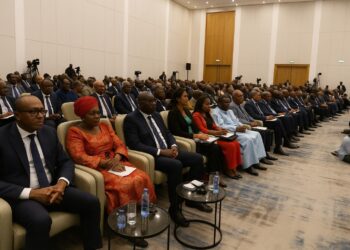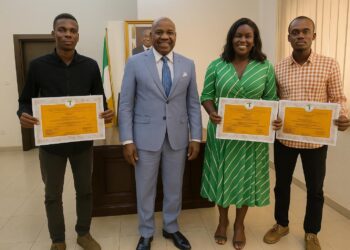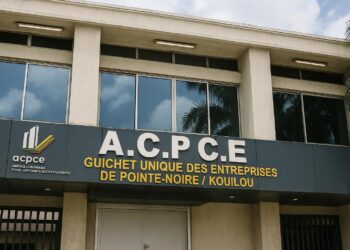African IP Day reaches its 26th edition
On 13 September, seventeen African nations simultaneously celebrated the 26th African Day of Technology and Intellectual Property, an annual reminder that competitive economies depend on the capacity to transform ideas into market-ready solutions. The commemoration also marked the third anniversary of the African Intellectual Property Organization’s establishment, consolidating regional cooperation.
Human capital anchors the 2023 theme
This year’s theme, “Human Resources in Intellectual Property and Africa’s Technological Development”, shifts attention from legal frameworks to people. Skilled examiners, lawyers, researchers and entrepreneurs are now viewed as the decisive factor that converts statutory protection into tangible industrial output and job creation.
Minister Fylla Saint-Eudes outlines Congo’s vision
Delivering the national message, Congo’s Minister of Industrial Development and Private-Sector Promotion, Antoine Thomas Nicéphore Fylla Saint-Eudes, stressed that intellectual property safeguards inventions, artistic works, designs, symbols and trademarks. “Exclusive rights empower creators, enhance control over use and generate financial returns,” he noted, framing IP as an innovation catalyst.
Two pillars: industrial and literary rights
The minister recalled that African IP regimes rest on two complementary pillars. Industrial property awards patents, trademarks and design registrations that spur commercialisation, while literary and artistic property secures authors’ economic and moral rights. Together, they offer a holistic incentive system attractive to investors seeking predictable asset protection.
Presidential backing for capacity programmes
Fylla Saint-Eudes highlighted the role of President Denis Sassou Nguesso in steering government efforts. According to the minister, the presidency’s guidance encourages Congolese research centres, universities and training institutions to embed IP modules in curricula, thereby equipping graduates with the skills demanded by emerging knowledge-based sectors.
Universities become IP talent hubs
By integrating patent drafting, technology-transfer negotiation and copyright management into engineering and business degrees, tertiary institutions can accelerate the transition from laboratory prototypes to scalable enterprises. Faculty‐industry partnerships also familiarise students with real-world infringement risks and licensing opportunities, aligning academic output with national industrial priorities.
Corporates urged to treat IP as a strategic asset
The minister invited companies as well as support structures to position intellectual property at board level. In his view, patent portfolios and brand equity can unlock financing, while robust IP management mitigates supply-chain leakages. Such alignment turns IP offices from compliance gatekeepers into growth enablers, especially for export-oriented firms.
Investment implications for local and foreign players
Investors evaluating Congolese or wider African ventures increasingly scrutinise intangible assets alongside physical infrastructure. Clear ownership records, enforceable patents and transparent royalty channels lower due-diligence risk, shorten fundraising cycles and justify higher valuations. Strengthened human capacities therefore translate into improved country competitiveness indices and capital inflows.
OAPI: a regional one-stop shop
Created in 2020, the African Intellectual Property Organization groups 17 states under a single registration system. Entrepreneurs file once in Yaoundé and receive protection across all member markets, drastically cutting administrative costs. For Congo-based innovators, this framework widens commercial horizons without duplicating legal fees.
Continental mandate from 1999 decision
The African IP Day itself dates back to a 1999 resolution by the Conference of Heads of State and Government of the Organisation of African Unity. The annual observance offers a forum to review progress, debate policy and craft coordinated strategies that weave IP protection into development blueprints.
Balancing innovation incentives and public interest
While exclusive rights fuel private-sector R&D, policymakers must also ensure access to essential technologies. Training programmes now emphasise flexibilities such as compulsory licensing and fair-use exceptions, equipping officials to negotiate agreements that uphold both inventors’ rewards and societal welfare. Informed human capital thus prevents zero-sum outcomes.
Financing the skills agenda
Funding remains a bottleneck. Government budgets must cover examiner recruitment, IT modernization and outreach campaigns. The minister’s call therefore resonates with multilateral lenders and development partners who increasingly link concessional credit to knowledge-economy reforms. Transparent progress indicators will help channel assistance to priority capacity-building projects.
SME empowerment through simplified procedures
Small and medium-sized enterprises often view IP registration as costly and bureaucratic. Congo’s authorities are reviewing fee structures and digital filing tools to improve uptake. Simplified guidance, available in French and local languages, ensures artisans and agri-processors can protect brands that distinguish their products in regional markets.
Digitalisation of IP offices
Electronic repositories reduce backlog, speed up examination and enhance public access to prior-art databases. Training staff to operate such platforms is central to the Day’s focus on human capacity. Over time, data analytics can identify technological strengths and guide targeted industrial-policy incentives.
Boosting public awareness
Celebrations included radio debates, university seminars and online campaigns explaining how intellectual property intersects with daily life, from music streaming to pharmaceutical packaging. This grassroots dimension complements high-level policy dialogues, ensuring that creators in rural areas perceive IP not as abstract law but as a practical development tool.
Aligning with private-sector expectations
Corporate executives consulted during the Week reiterated the need for predictable enforcement. They encouraged authorities to professionalise inspection bodies and courts, arguing that swift resolution of infringement cases would build international confidence and attract technology-transfer agreements beneficial to local suppliers and subcontractors.
Measuring progress beyond filings
Success metrics are evolving from counting patent applications toward tracking commercial outcomes such as licensing revenue, start-up formation and job creation. The Ministry plans annual scorecards to monitor these indicators, turning the African IP Day into a checkpoint for evidence-based policymaking.
Outlook for the next twelve months
Over the coming year, Congo will refine regulations, deepen university partnerships and digitise its IP office. By reinforcing human capacities, authorities aim to transform intellectual property from a legal formality into a robust engine for inclusive and sustainable economic development. The continent’s innovation landscape will watch these steps closely.












































